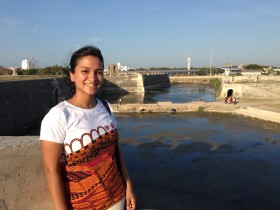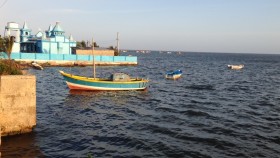This is part of a series in which we share reports from Harvard students who have traveled to South Asia with support from a SAI grant.
By Sarani Jayawardena, Harvard College ’17
A history textbook is a complex item, lying at the intersection between ethnic politics and education policy. I did not think about that as a student in school – then, the history textbook was something to read, memorize, and cough back up at end-of-year examinations. But when governments write curricula or textbooks, the history textbook starts to mean much more. It becomes a tool by which the state can transmit its historical narrative, its version of the official past of a country. It becomes a direct articulation of what the state considers an accurate narrative and a desirable national identity for its citizens.
Yet “national history” is subjective: differences in identity – whether by race, religion, language, social status, class, or gender– can drastically alter personal conceptions of history. Thus multi-ethnic countries face a multiplicity of versions of past and conceptions of identity. Many South Asian nations have witnessed ‘textbook controversies’ or ‘textbook wars’ because of this complexity.
I spent the summer of 2016 examining these charged politics in Sri Lanka. I conducted research for my senior thesis, which will seek to understand how and why government-issued history textbooks have changed in how they depict ethnic minorities during the course of the civil war and afterward. My research consisted two parts. One element was to analyze the current and past textbooks to understand how depictions of minorities have changed. The second was to interview those involved in the production of textbooks, to assess the influences on the process.
Thanks to the generous funding received from the South Asia Institute, I was able to achieve both of those goals. I am now back on campus and getting into the process of writing my thesis, and I am so thankful for having been able to do my research over the summer.
I am from Sri Lanka and lived there prior to coming to Harvard, so whenever my research kept me in Colombo I stayed at my family’s home. Doing a solo research project in Sri Lanka was actually an incredibly new experience, during which I learned much more about my own country. I interviewed 27 people connected to the production of textbooks, ranging from an ex-Secretary to the Ministry of Education, to present administrators at the National Institute of Education and Educational Publications Department, to leaders of civil society who have campaigned for and against textbook reform, to academics studying history across the country.
From these conversations, I learned about the politics and pressures at play in the production of a history textbook. I also gained some great insight about the complexities of education policy and reform in general, which I truly valued since I plan to work in education in Sri Lanka in the future. For this same reason, I appreciated all the time I spent in the different government agencies and ministries, as I could perceive how different branches of the government worked.
Some of my favorite experiences this summer included several trips to Jaffna in the North, and Kandy in the center, to speak to academics based at the Universities of Jaffna and Peradeniya respectively, as well as different civil society organizations such as the Ceylon Tamil Teachers’ Union. I had not visited either city for many years, and traveling there alone as a researcher was a completely new experience. Memories I will particularly cherish from the summer were my train rides between Colombo, Peradeniya and Jaffna: racing the sunset as the Udarata Menike barreled down the central hills at dusk, or watching the changing landscapes of Sri Lanka as the Yal Devi rushed north through wet zone, dry zone, town, field, village, and jungle.
Once, as I was going up to Peradeniya for an interview, the train engine broke down. We were stuck for an hour in the middle of nowhere waiting for a replacement engine, as I slowly realized that I was going to miss my interviewee – whom I had been trying to interview for weeks. As the conductor walked through the compartments I explained my predicament to him, and he suggested that I hop off the train and wait for another one that would pass by soon. As I stood on the edge of the other track with ten other passengers preparing to unceremoniously switch trains, surrounded by paddy fields, I felt very far from Cambridge MA.



